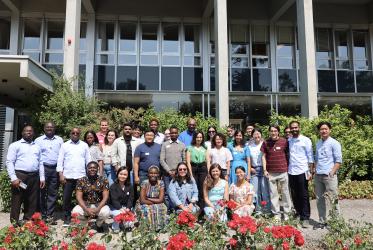Young people call for unity, justice and inclusive community
Thirteen young people, we met in Antelias from 14-16 November 2003 - at the invitation of the World Council of Churches and as guests of the Armenian Apostolic Church (Cilicia) - to reflect together on a new configuration of the ecumenical movement. Embracing the rich diversity of our experiences, we shared our dreams and visions for the future.
We are meeting at a time of quickening change in global circumstances. The global situation is characterised by violent conflicts, a widening gap between the rich and the poor, economic injustice, the HIV/AIDS pandemic and environmental degradation, to name only a few of its features. In the broken lives of millions, we see the suffering of Christ and hear His cry for justice and healing. And at the same time, the call for more responsive and concerted Christian action is growing louder.
We therefore affirm the need to revisit the vision and direction of the ecumenical movement, and to look beyond the current structures and organisational formulas. The very word "movement" implies dynamism, constant self-evaluation, and change.
Despite the declining presence and activity of young people in churches in most parts of the world, many young Christians remain passionately committed to the ecumenical movement. This gives us hope and encouragement. However, we witness that their desire to solve the current problems of the "oikoumene" is finding more and more expression outside the churches and ecumenical organisations. This questions the relevance of the ecumenical movement.
Our vision of the ecumenical movement
"Let us do together what we can do together.
What we think we cannot do together - together let us find the way to do it together."1
We envision a new ecumenical movement characterised by a renewed commitment of churches and ecumenical organisations. Being ecumenical belongs to the very essence of being Church, and is not just an issue of external relations. New understanding of the role of the ecumenical movement will emanate from a "new" understanding of the mission of the Church as an inclusive community caring for life, not only for Christians, but for all people of God, for creation, for the whole "oikoumene". The 21st century will see churches sharing in the eucharistic fellowship, praying and acting together for a reconciled and healed "oikoumene" in visible unity. The ecumenical movement of the 21st century must provide a safe space for honest and respectful dialogue that is devoid of "cosy ecumenism" but fosters a loving relationship among partners with trust, mutual accountability and lasting commitment as key values.
We dream of an ecumenical movement where young people, with all their talents and skills, take an active part and leadership in all its dimensions. The ecumenical movement bears witness to the inclusive nature of the Church as the body of Christ. In its diversity lies its full strength and richness. The ecumenical movement of the 21st century needs to be owned by all churches and ecumenical organisations. Embracing diversity is essential for the sustainability of the ecumenical movement as a movement of the people where the people set the agenda.
"My bread is a material issue. My neighbour's bread is deeply spiritual."2
How we deal with money is a spiritual matter. In the spirit of caring, love and justice, ecumenism will entail giving no less than we are able to give. We envision that ecumenical organisations and churches will work together for justice on the basis of their common faith, rooted in the Bible, and will transform unjust structures. Sharing of material and non-material resources, of gifts, stories and capacities but also of burdens and duties will reflect our unity in Christ. Money should serve decisions - not buy decisions.
The ecumenical movement is called to offer an alternative to globalisation. Churches and ecumenical organisations need to think "oikoumenically" and act locally. A vision of "oikoumenisation", as opposed to globalisation, will strive for global community in full respect of the diversity of its members.
The ecumenical movement, as a movement deeply rooted in the realities and traditions of our churches and ecumenical organisations, needs to be a movement of all people, not just a clique of "ecumeniacs". This requires a "mainstreaming" of ecumenical formation through sharing of wisdom and knowledge, education and ongoing formation for people of all ages and ranks.
The 21st century needs cohesion and transparency in the cooperation of strong ecumenical groups and bodies on local, national, regional and global levels. Considering the complexity of many of the issues the world is facing, the ecumenical movement needs to connect the prophetic voice of the Church with the voices of peoples' organisations and movements struggling for the same objectives.
Our vision is that churches in the ecumenical movement of the 21st century will view people of other faiths as being part of God's household. The daily dialogue of life offers a basis for peaceful and constructive relationships and cooperation.
Our recommendations on how to pursue a new configuration
The reflection on a new configuration should continue at all levels (globally, regionally, nationally and locally) with input from all ecumenical bodies and organisations. It should be based on people's realities both in church and society.
People from diverse backgrounds should be involved in this process, taking into consideration age, gender, ethnic group, Indigenous peoples groups, sexual orientation and different capacities.
The ecumenical movement started in the last century with young people - in the World Student Christian Federation (WSCF), the Young Men's Christian Association (YMCA) and the Young Women's Christian Association (YWCA) - taking leadership. This reminds us of the important role young people can play. Therefore we strongly encourage young people from all ecumenical youth organisations to be an integral part of this process.
As young people, we fully accept this responsibility. We expect to take risks and bold steps, opening ourselves to the work of the Holy Spirit.
Above all, clothe yourselves with love,
which binds everything together in perfect harmony
Colossians 3:14
Notes
(1) Paraphrase of what is usually known as the "Lund Principle" (3rd World Conference on Faith and Order, Lund, Sweden, 1952), according to which churches should "act together in all matters except those in which deep differences of conviction compel them to act separately".
(2) Statement usually attributed to the Russian philosopher Nikolai Berdiaev.





